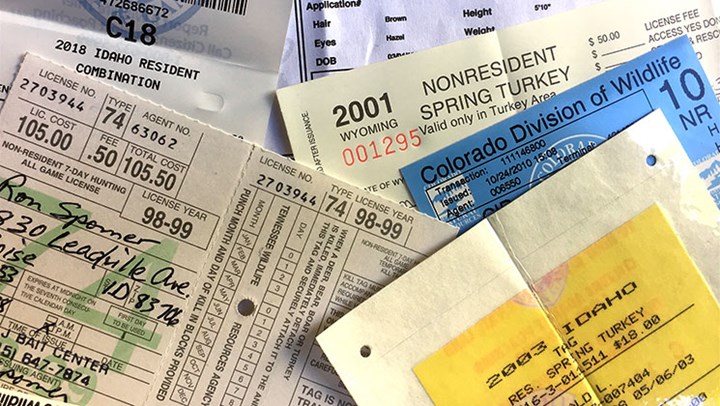
by Ron Spomer - Wednesday, June 27, 2018

My wife picked up her hunting and fishing license the other day so she could apply for limited deer, elk, and pronghorn tags. It cost her just $11.75.
“Mine was $33.50,” I said. “Did you get a fishing license only?”
“No, I got the combo hunt-and-fish senior license.”
Senior discount license? I missed my chance. At 65, I’ve officially entered the ranks of “washed up” senior citizens, proven by forgetting to buy the discount license.
But I don’t care. I’m investing in my hunting success. My license and tag fees are paying the freight for fish and wildlife protection, restoration and maintenance. I, like generations of hunters before me, am responsible for the abundance of game species in North America. If not for hunters, many species from wild turkeys to elk and pronghorns would probably be on the endangered species list.
This strikes most non-hunters as ludicrous. How can hunting and killing wildlife do anything but put it on the endangered species list?
Apparently lot’s of folks slept through high school biology.
Nature has been thriving these past 300 million years on a proven system of killing, eating and recycling. Lions, wolves, eagles, sharks, humans and a thousand other predatory species exist and hunt for a reason: It’s necessary. Nature made it that way. Humans didn’t just fall off a passing comet. Nature/God didn’t give us stereoscopic vision, canine teeth, speed, cunning, hand-eye coordination, intelligence and tool-making skills so we could more efficiently eat grass. We are designed to hunt and eat meat.
The idea that eating any species, from tree squirrel to bison, would contribute to its extinction overlooks Burger King, Kentucky Fried Chicken and the ongoing abundance of cattle and chickens. Clearly we can have our animals and eat them, too.
In the animal world there’s something called mortality and reproduction. So long as annual reproduction exceeds annual mortality, populations remain stable or grow. But only if someone is guarding the hen house.
"If not for hunters, many species from wild turkeys to elk and pronghorns would probably be on the endangered species list."The “hen house” is whatever remnants of forest, grassland, swamps and wetlands survive plows, livestock, herbicides, dams, mines, suburbs, highways, malls, urban centers and other human-made modifications of the natural world. Which is most of the land here in the USA. We are a rich nation, and we got that way by utilizing our resources. Sometimes too much. And that’s where pay-to-play hunters saved the day.
More than 150 years ago a few astute hunters figured out that unlimited market hunting could wipe out entire species. But they also recognized that destruction of wild habitats was an even more serious, long-term threat. So they created a brilliant pay-to-play system in which sport hunters would actually pay for the privilege of guarding wildlife against habitat destruction and exploitation. Here’s how it works:
Hunters pay license and tag fees for the privilege to hunt for a few short seasons each year. That money pays biologists and game wardens to protect and enhance wildlife populations year round. They restrict seasons, establish bag limits, stop epidemics, arrest poachers, reintroduce species and restore critical habitats.
Within decades of this system starting, game species came roaring back: Pronghorns from 12,000 to more than one million. Elk from a few thousand in Yellowstone to more than 1.3 million in 17 states. Wild turkeys from the brink of extinction to more than 5 million in 49 states. On and on it went. Whitetails, giant Canada geese, moose, wood ducks, black bears, mountain lions, wolves … and millions of acres of wetlands and grasslands were saved from destruction.
Hunters did that. And all the while they got to hunt and eat the animals they were helping perpetuate.
So that’s why I don’t mind paying full freight for my hunting licenses. If they were twice the price it would still be a bargain because it lets me hunt and fish 365 days a year! Imagine what it would cost to go skiing, golfing, bowling, take-in a baseball game or see a movie every day for a year. And none of those activities put free-range, organic meat on your plate.
When I buy my hunting licenses I’m buying my fun, my escape, my joy and my future. I’m defending and perpetuating the wildlife and wild places I love.
■ ■ ■
About the Author: Well-known in the hunting industry, Ron Spomer has decades of hunting experience and writes regularly for multiple outdoor publications, including NRA Publications, sharing his vast knowledge on guns, ammo, optics and gear. Visit his website at ronspomeroutdoors.
E-mail your comments/questions about this site to:
[email protected]
Proudly supported by The NRA Foundation and Friends of NRA fundraising.
